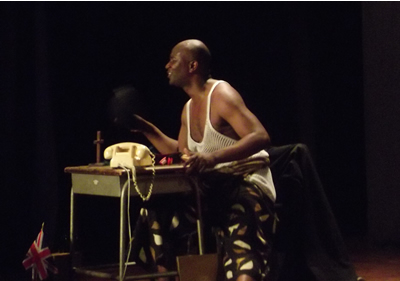HIFA 2011: The Man who Committed Thought
A man, educated and African, finds himself in the gallows, charged with crimes against humanity. He is a lawyer, educated in England, with a firm belief in Christian values, and has more than just a passing admiration for the Queen and his adopted country. He is a man who has been alienated from his culture, identity and people. Mamadou, a peasant farmer with a sizeable family but limited means bursts into the lawyer’s life begging him for help, or rather mercy. Mamdou’ s cow has expropriated by the government without compensation and now he wants to sue, to take back the rights that were forcibly taken from him. As the story unfolds the lawyer encounters the corrupt and powerful President Junta, who is shortly unseated in a coup led by ‘Tuff Boy’ a rebel leader. It is only when he witnesses the murder of Mamadou at the hands of the rebels that the lawyer finds his humanity, but in his quest for justice he commits unspeakable crimes, for which he is brought before the court.
The facts of the play may be specific to Sierra Leone, but it is the story of every African country cursed with resources. President Junta may be a dictator, but he is a democratically elected one. He is fat and wealthy off the numerous kick-backs and deals he receives from governments and multinational corporations wishing to do business in his country. Western leaders, donors and corporations treat him like a king, as though the country and its people were his personal property; unchallenged, he behaves accordingly.
‘Tuff Boy’ is a grotesque illustration of a rebel leader, high on cocaine, formerly angry and powerless, until he took up arms and waged war on the government. Tuff boy asserts his power through the gun and innumerable rapes of women who feature in the play as nameless, faceless and voiceless victims.
Colonialism lives on in the lawyer, who condescends towards and patronises Mamadou. Despite his high handed Christianity, the lawyer is torn between his disdain of the ignorant and poor ‘native’, and his baser native instinct which drives him to lust after Mamadou’s daughter.
The man who committed thought is a moving play that is an indictment of the hypocrisy of the human rights agenda, aid, and the nations that give it. It illustrates the conflict between humanitarianism and humanism, and shows that right and wrong are not necessarily black and white, but rather, they are painted in shades of grey.


